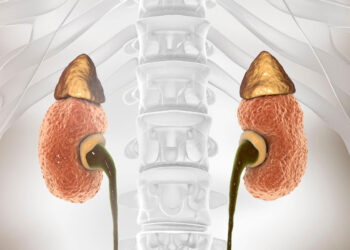TOPLINE:
Ruxolitinib demonstrated superior long-term outcomes in steroid-refractory/dependent chronic graft-vs-host disease (SR/D-cGVHD) with median failure-free survival of 38.4 months compared with 5.7 months for the best available therapy (BAT). The treatment maintained efficacy through 3 years, with 59.6% of ruxolitinib-treated patients sustaining response at 36 months compared with 26.7% with BAT.
METHODOLOGY:
- Researchers conducted a randomized, phase 3, open-label, multicenter study involving 329 patients aged ≥ 12 years with moderate/severe steroid-refractory/dependent chronic GVHD.
- Participants received either ruxolitinib (10 mg twice daily) or investigator-selected BAT in a 1:1 randomization for 24 weeks during the primary efficacy period.
- Analysis included a follow-up period from weeks 24-156, where patients could continue randomized treatment or cross over from BAT to ruxolitinib.
- Safety monitoring continued for 30 days after the last dose, with patients who permanently discontinued treatment entering long-term survival follow-up until week 156.
TAKEAWAY:
- Median failure-free survival was significantly longer with ruxolitinib at 38.4 months compared with 5.7 months for BAT (hazard ratio [HR], 0.36; 95% CI, 0.27-0.49).
- The probability of maintaining response at 36 months was higher with ruxolitinib at 59.6% (95% CI, 50.4-67.6) than with BAT at 26.7% (95% CI, 18.5-35.5).
- Among 70 patients who crossed over to ruxolitinib, overall response rate was 50.0% (95% CI, 37.8-62.2) at week 24, with best overall response of 81.4% (95% CI, 70.3-89.7).
- Nonrelapse mortality rates at 36 months were 17.8% (95% CI, 12.4-24.1) for ruxolitinib vs 22.0% (95% CI, 15.7-29.0) for BAT.
IN PRACTICE:
“Ruxolitinib provided longer FFS [failure-free survival] and DOR [duration of response] than BAT, demonstrating sustained efficacy and manageable safety over 3 years of follow-up in patients with SR/D-cGVHD,” the authors of the study wrote.
SOURCE:
This study was led by Robert Zeiser, MD, Department of Medicine I, Faculty of Medicine, Medical Center, University of Freiburg, Freiburg, Germany. It was published online on June 25 in Journal of Clinical Oncology.
LIMITATIONS:
Due to the 3-year study period, discontinuations resulted in low final patient numbers that precluded meaningful assessment of some endpoints, including quality of life and patient-reported measures, though these had been demonstrated in previous analyses.
DISCLOSURES:
This study was supported by Novartis and Incyte. Zeiser declared receiving support from Deutsche Forschungsgemeinschaft through a grant (SFB-1479 – Project ID: 441891347) for data analysis and manuscript development. Additional disclosures are noted in the original article.
This article was created using several editorial tools, including AI, as part of the process. Human editors reviewed this content before publication.
Source link : https://www.medscape.com/viewarticle/ruxolitinib-boosts-survival-resistant-gvhd-2025a1000lfl?src=rss
Author :
Publish date : 2025-08-13 12:21:00
Copyright for syndicated content belongs to the linked Source.











